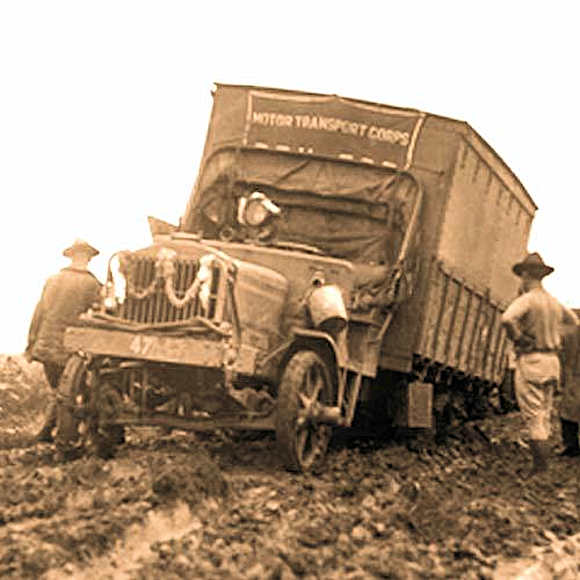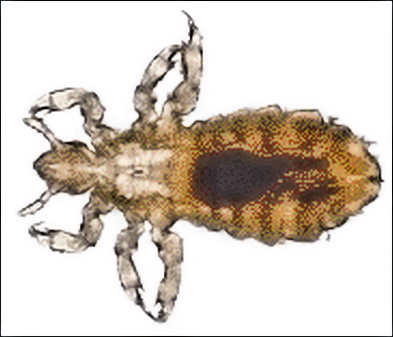 |
| Mud Was Everywhere |
By Gary Mead
It was impossible to keep clean in the trenches. Dirt bred disease, and with only the most primitive drugs, many diseases which are today innocuous could be life-threatening. They also sapped the AEF's fighting power. Official figures show 71 per cent of duty-time lost in the AEF in France was through disease, against just 22 per cent from battle injuries. In 1918, influenza, pneumonia and other respiratory diseases caused 17.33 per cent of all AEF hospital admissions for disease and 82 per cent of illness-related deaths. The same year the total number of AEF soldiers admitted to hospital for disease was 2,422,362. . . Officers were as prone to succumb to bullet or bug as their charges. . .
The vermin [a.k.a. cooties] were about the size and color of small grains of uncooked rice until they would gorge themselves on the blood of their victims. Apparently their digestive system was in the shape of a cross, since when they were well fed, a black cross could readily be seen. The troops considered this a black German Iron Cross. It was a standing joke that there was no point in scratching because the little buggers had legs on both sides. The Army had a "delousing" program which consisted of, thank God infrequent, visits of a large tank-truck-like device and a steam generator. We were required to completely disrobe and toss our clothes into a bundle which was then thrown into the tank and live steam cooked the bugs. During this time we froze, of course, since the contraption never came on a nice warm day, but usually made its appearance during the winter months. After submitting to this we were louse-free until we crawled back into the hay beds, when we again became infested.
 |
| The Enemy (Not Actual Size) |
There was not much to be done about the cootie, except to grin and bear it. In a June 1918 issue of Stars and Stripes, "W.D.B." offered this "remedy" for the cootie:
First, get a rope or wire, rope preferred, that is about 30 feet long and has two ends. Be sure you get both ends. Then place one end on the ground and the other in the air, climb up and place some cheese or butter—butter preferred—on the top, then come down and hide. You will not have to wait long before a Mr. Cootie will be along. He, of course, hears the butter or cheese up on the rope or wire, and goes up to get a bite. Now, climb up yourself and cut the wire or rope about two feet below Mr. Cootie and place on that end an ice cream cone. Then come down and hide. Mr. Cootie will get all the butter or cheese he wants and start down, not knowing the wire or rope is cut, and fall in the ice cream cone and freeze to death. The same cheese or butter will work for a day or more, if you remove the dead immediately.
The cootie was but one element in a generally filthy existence, a lifestyle which shocked and distressed most Doughboys, who could never accustom themselves to the coarseness of the French billets—usually farmyard buildings—they were expected to occupy when in the rear areas. U.S. armies traditionally built their own encampments but the exigencies of trench warfare made this expensively pointless and French billets were generally used. Many Doughboys decided that a leading feature of the French character was a distinct lack of interest in basic hygiene:
 |
| French Houses Displaying Their Dung Piles |
One of the conditions of this life of billeting the American soldiers never did fully adapt themselves. It was to the fumier—the heap of manure piled at the front door of every villager—the sign of his thrift and even of his wealth, but a disagreeable thing, irritating and dangerous in the dark, and a kind of front yard ornamentation to which our soldiers could never grow accustomed [...] this one little thing was the cause of more impatience and irritation of American soldiers toward the French population than anything that I can now remember. The French villagers' habit of having farm animals and people living close together under the same roof was repulsive to our sensibilities.
Source: Excerpted from The Doughboys: America and the First World War; Reprinted by permission of the author and publisher.

One of my great grandfathers served in a Mobile Laundry Unit. Might not be heroic like being a MOH recipient, but he may have saved as many lives.
ReplyDeleteVery interesting! And where and how he served aren't important - he served where he was either told to or most needed. I'm heading "over there" this summer, so hope to see many of the memorials and markers dedicated to men like your great grandfather.
ReplyDeleteI went a few years ago. Amazing experience, Would love to go back someday.
DeleteBe watchful for bed bugs etc in those flea bag hotels
Delete